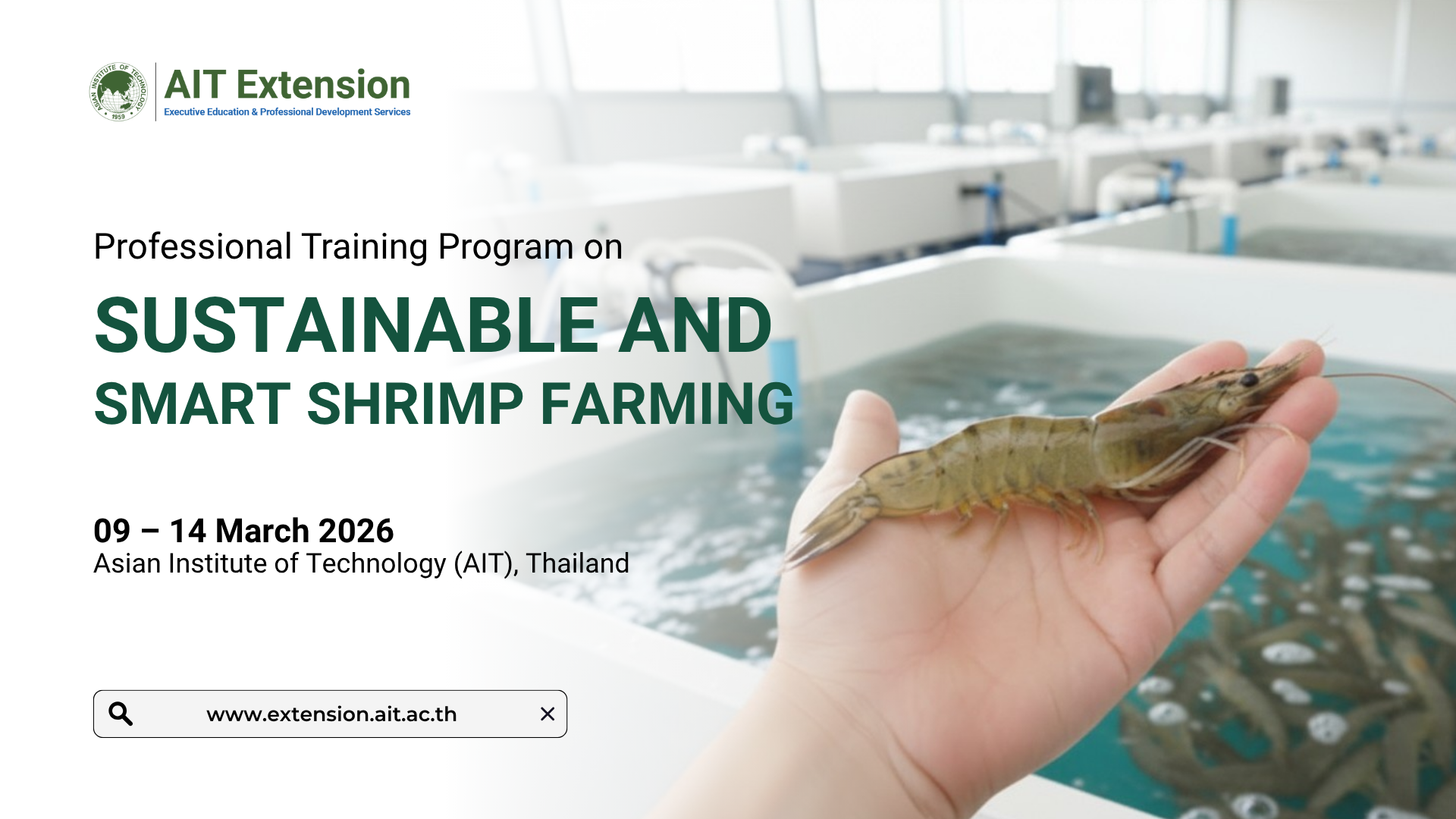Course Introduction
PROGRAM BACKGROUND
The global population is projected to reach 9.7 billion by 2050, creating unprecedented demand for food and nutrition. However, traditional food production systems are increasingly challenged by climate change, global warming, and resource degradation, threatening global food security. In this context, fisheries and aquaculture remain vital sources of protein and livelihoods, with shrimp farming emerging as one of the most dynamic and profitable sectors.
Over the past two decades, shrimp farming in Southeast Asia—particularly in Thailand—has evolved from small-scale, tidal-based operations into a highly sophisticated industry driven by innovation, adaptation, and strong entrepreneurial spirit. The transition from black tiger shrimp (Penaeus monodon) to white shrimp (P. vannamei) farming since 2001 has revolutionized the sector, offering higher productivity, disease resistance, and economic returns. Thailand’s success in integrating technological innovation and good management practices provides valuable lessons for other countries seeking to enhance production efficiency and sustainability.
Yet, as the industry expands, it faces mounting challenges—disease outbreaks, water pollution, habitat degradation, and social equity concerns. To ensure long-term viability, shrimp farming must embrace sustainable and smart approaches that balance profitability with environmental and social responsibility.
This one-week training program on “Sustainable and Smart Shrimp Farming” aims to build the capacity of practitioners and policymakers to apply eco-friendly practices, digital tools, and data-driven technologies for climate-resilient shrimp production—ensuring food security, economic prosperity, and healthy aquatic ecosystems for future generations.
PROGRAM OBJECTIVE AND LEARNING OUTCOMES
This training program aims to build participants’ capacity in sustainable and smart shrimp farming by integrating eco-friendly practices with modern technologies such as IoT-based monitoring, precision feeding, and data-driven farm management. The course will enable participants to improve productivity, ensure environmental compliance, and enhance climate resilience in shrimp aquaculture systems. By the end of the training, participants will be able to:
- 1. Apply sustainable management and biosecurity practices in shrimp farming.
- 2. Utilize smart technologies for real-time monitoring and decision-making.
- 3. Implement strategies for reducing environmental impacts and improving water quality.
- 4. Assess the economic and environmental performance of shrimp farming systems.
- 5. Develop farm-level action plans for climate-resilient and sustainable aquaculture.
PROGRAM CONTENTS
The delivery of this professional training course will be participant centered encompassing two major aspects: classroom based technical sessions and field/study visits. The classroom-based sessions will be comprised of class lectures, case studies, hands-on sessions and group discussions. Field visits will be a major part of this training course. The field visits will deepen learning from classroom-based studies and will provide a ‘live’ experience for the participants on how the farming practices are being pursued in Thailand and what are the roles of various government departments, farmers and research institutes/organizations.
The overall content will cover the following aspects of shrimp farming:
- - Global and regional trends in shrimp aquaculture
- - Sustainable aquaculture and nature-based solutions (NbS) in shrimp farming
- - Pond design, pond preparation, feeding, and water management practices
- - Biosecurity and health management strategies
- - Disease prevention, risk management, and early warning systems
- - Application of smart technologies and automation tools in shrimp farming
- - Waste management and nutrient recycling techniques
- - Climate-resilient and Integrated Multi-Trophic Aquaculture (IMTA) Systems
- - Market access, traceability, and certification standards (ASC, BAP)
- - Economic and investment perspectives in smart aquaculture
- - Field exposure to model shrimp farms and technology demonstrations
Training Fee: USD 1,500/-
(Inclusive of training-related expenses, excluding accommodation and subsistence allowances. AIT will assist in booking accommodation)
Medium of Instruction: The medium of instruction of this program will be English. Where discussions are in Thai, such as during field or organization visits, a local Thai interpreter will be available to assist.
Training Design: The training program will include technical input sessions, interactive lectures, practical sessions and field exercises/workshops, Key Learning Points (KLP), Group Action Plan/Project (GAP), experience sharing sessions. The technical sessions will be accompanied with field trips to respective farm or research station/laboratory of academic institute. The actual duration of the complete training course is 6 Days; the course content will have 3 days of technical sessions followed by 2 days of field trip and 1 day for Group Action Plan (GAP). The course will be taught by internationally renowned academicians (from AIT and Kasetsart University - Thailand), shrimp farming experts, researchers, professional trainers and practitioners.
Target Participants: This program is designed for:
- 1. Shrimp farmers and aquaculture practitioners
- 2. Officers from fisheries and environmental departments
- 3. Researchers, academicians, and extension workers
- 4. Private sector investors and agritech entrepreneurs
- 5. NGOs and development professionals working in aquaculture and coastal livelihoods
📜 Certificate: Successful Candidate will be awarded with Certificate of Completion.
Registration Deadline: 31 Jan 2026
15 Feb 2026 (Thai and Participant with on-arrival Thai Visa Option)
⏰ Duration: 06 days
🏢 Venue: AIT, Bangkok, Thailand
For any further queries regarding participation and registration, please contact:
Mr. Md Anishur Rahman I anish@ait.asia I Tel: +66 98 883 3562
Dr. Md. Zakir Hossain I zakir@ait.asia I Tel: +66 81 694 0759
General Contact/Query:
AIT Extension
Asian Institute of Technology (AIT)
58 Moo 9, Km. 42 Paholyothin Highway, Klong Luang
Pathum Thani 12120, Thailand
extension@ait.ac.th
+66 2 524 5338/6100
